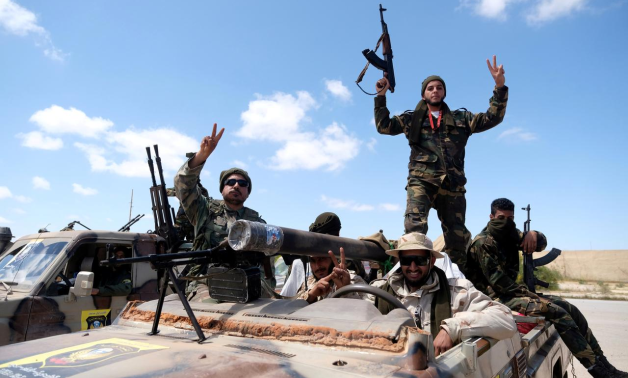
FILE PHOTO: Libyan National Army (LNA) members head out of Benghazi to reinforce troops advancing towards Tripoli, in Benghazi, Libya, April 7, 2019. REUTERS/Esam Omran Al-Fetori/File Photo
CAIRO – 14 September 2020: Member of the High Council of State in Libya, Belkacem Qzeit, said that Egypt is a vital pillar in the Libyan solution, praising the country's great role in the effective and accelerating developments that occurred during the past two months.
Qzeit urged the Egyptian state to further intensify communication with the western region of Libya.
In lengthy statements during his participation in the Cairo meetings, Qzeit stressed that the Libyan delegation called on Egypt to stabilize and support the ceasefire in Libya, along with supporting the political process, in light of its impact in Libya, being regarded the closest neighbor for Libya.
He explained that the Libyan delegation intended to meet with several Egyptian officials to lay down a roadmap consistent with the efforts of the United Nations mission to amend some statements and proposals.
The member of the High Council of State indicated that the majority of the members of the delegation visiting Cairo believed that the most important point is to install the ceasefire, stressing that the Libyan people also need to unify the institutions of power and sovereign positions.
He praised the Libyan military meetings that Cairo hosted in recent years, but the recent changes after the battle for Tripoli had complicated matters, explaining that Libya needs a national military institution that represents the Libyan people without exception.
The High Council of State memberemphasized the need for uniting the civil, sovereign and executive institutions, asserting that if the Libyan state achievesthat goal, the military institution willbe unified.
Qzeit denied the accusations raised by some Libyan parties that the city of Misurata supports terrorismand explained that the city has fought the terrorist organization ISIS in Sirte. He further noted that the flags of ISIS and Al-Qaeda have never been raised inMisurata.
When asked about the foundations for a political solution to the Libyan crisis, he stressed the importance of the cohesion of the Libyan parliament and the support of all Libyan parties.
This is in addition to the formation of a new presidential council representing all Libyan regions, as the current council does not represent Libya. He reiterated thatLibya needs a presidential council, a separate government and a unitedparliament.
Qzeit explained that the idea of removing the government from Tripoli temporarily needed discussion; that is why unifying sovereign positions is very important. He alsopointedout that the recent Swiss meetings do not represent all the Libyan people, and that the United Nations Support Mission in Libya(UNSMIL) "was lying."
The UN mission denied any relation with the Swiss meetings and claimed that the Humanitarian Dialogue Organization is responsible for organizing the dialogue. He added that the mission is not sincere, and what the Libyan parties have agreed upon in Switzerland is not binding. "It is just a discussion," he said.
Furthermore, the member of the High Council of State criticized what he described as the "hypocrisy" of the UN mission. "We are not comfortable with the way Stephanie Williams is doing," he continued.He also urged the United Nations Support Mission in Libya to work transparently and fairly, and without bias to any party ofthe conflict.
"The UN mission in Libya, during GhassanSalameh’s tenure, was operating in an unfair manner; we reject their choices, as their way inmanagingthe Libyan file is not convincing and incomprehensible," he stated.
Moreover, Qzeitaffirmedthat the Libyan people reject the presence of foreign mercenaries and militias as well asthe presence of any foreign forces in the Libyan territories.
He also confirmed that Saif al-Islam is welcomed to run for president if he is acquitted by the Libyan courts, and that there is contact with supporters of the former Libyan regime.
On July 20, the Egyptian House of Representatives authorized President Abdel Fatah al-Sisi to “take the necessary measures” to protect national security, giving the president the green light to send troops to Libya.
This came in a closed session on protecting the Egyptian and Libyan national security against terror threats. The session was attended only by the Parliament members and the general secretariat of the House.
During his meeting with the tribal chiefs on July 16, Sisi said that any Egyptian military intervention in Libya may only take place upon a request by the Libyan people and permission from the Egyptian House.
According to Article 152 of the Egyptian constitution, the state has to seek the Parliament’s approval before declaring war or sending its forces in combat missions. The members attending the session are not authorized to disclose any details of the discussion inside this secret meeting.
Libya is suffering a severe division between two factions; the Libyan Parliament and the Libyan National Army (LNA) led by Field Marshal KhalifaHaftar in the east and the GNA led by Fayez Al-Sarraj. The latter is internationally recognized but is not accepted by the Parliament.
Hundreds were killed in continuous battles between the LNA and the forces of the GNA over the past year.
Oil-rich Libya has been mired in chaos since the ouster and killing of Muammar Gaddafi in 2011. It now has two rival authorities and a multitude of militias vying for control of the country.
The country’s internationally recognised government is based in Tripoli, while KhalifaHaftar, the commander of the Libyan National Army, is supported by a parallel administration based in the east.

Comments
Leave a Comment